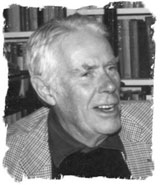影片對(duì)白 The inventor of the superstore. Of course. The enemy of the Mid-list Novel. The destroyer of City Books. Tell me something really, how do you sleep at night?
6. Don’t take the whole thing. Just half.
不要吃一整片/整個(gè)都吃了。吃一半就行了。
7. I'm flattered.
“我很榮幸”。當(dāng)別人奉承你時(shí),你就可以說(shuō)這句話。
8. Cross one's mind
這個(gè)片語(yǔ)的意思是“suddenly occur to one 突然想起,想起”,例如:It never crossed my mind that they would turn the proposal down. 我從來(lái)沒(méi)想過(guò)他們會(huì)拒絕這個(gè)提議。
文化面面觀

1. The Observer
The Observer is a United Kingdom newspaper published on Sundays. Overall slightly to the right of its daily sister paper The Guardian, it takes a liberal/social democratic line on most issues.
The first issue, published on 4 December 1791 by W.S Bourne, was the world's first Sunday newspaper.
The Observer was National Newspaper of the Year at the British Press Awards 2007
Whitehall Editor Jo Revill had, as Health Editor, been named Medical Journalist of the Year in 2000 and 2006 by two different organisations, when she was Health Editor.

2. Anthony Powell
(born Dec. 21, 1905, London, Eng. — died March 28, 2000, near Frome, Somerset) British novelist. He published his first novel, Afternoon Men (1931), while working in a London publishing house. He worked in journalism and served in World War II before publishing the first of 12 novels in the autobiographical and satiric series A Dance to the Music of Time (1951 – 75). His best-known work, it reflects his outlook and experiences of English society in the decades before and after the war. His later novels include The Fisher King (1986).

3. Ethel Rosenberg
(1915-53), spy. Raised on the Lower East Side in her native New York, Rosenberg held clerical jobs and was a union organizer before marrying Julius Rosenberg in 1939. In the years that followed, she devoted herself to raising her children. In August 1950 Ethel Rosenberg was arrested and charged with spying for the Soviet Union along with her husband; the two were accused of passing on information related to the atomic bomb. Ethel's brother, David Greenglass, provided damaging testimony against the Rosenbergs, placing them at the center of a spy ring. The Rosenbergs' attorney provided a weak defense, and the two were convicted and sentenced to death on April 5, 1951. Despite pleas from around the world that the sentences be commuted, the anti-Communist fervor of the times, along with latent anti-Semitism, prevailed, and the two were executed on June 19, 1953. In the decades that followed, serious questions about aspects of the government's case and the reliability of its witnesses were raised; evidence provided by the Russians after the fall of the Soviet Union and by the Federal Bureau of Investigation, while tending to confirm Julius Rosenberg's guilt, leave open the question of his wife's involvement. The authenticity of this evidence has been challenged by the Rosenbergs' sons.

4. Luddite movement
The Luddites were a social movement of English textile artisans in the early nineteenth century who protested — often by destroying textile machines — against the changes produced by the Industrial Revolution, which they felt threatened their livelihood.
This English historical movement has to be seen in its context of the harsh economic climate due to the Napoleonic Wars; but since then, the term Luddite has been used to describe anyone opposed to technological progress and technological change.
The Luddite movement, which began in 1811, was named after a mythical leader, Ned Ludd.
考考你
用今日所學(xué)將下面的句子譯成英語(yǔ)。
1. 警察已經(jīng)監(jiān)視這伙匪徒好幾個(gè)月了。
2. 我突然想到他可能對(duì)我說(shuō)了謊。
You've got mail《電子情緣》精講之一
1. 她買下了一家公司,經(jīng)營(yíng)的非常好。
She bought out company and is doing very well.
2. 又一家制造商垮掉了。
Another manufacturer has bitten the dust.
3. 我很抱歉,我不應(yīng)該對(duì)你過(guò)分苛責(zé)的。
I'm sorry, I shouldn't have jumped over your throat.
影片對(duì)白 The inventor of the superstore. Of course. The enemy of the Mid-list Novel. The destroyer of City Books. Tell me something really, how do you sleep at night?
點(diǎn)擊進(jìn)入:更多精彩電影回顧
(英語(yǔ)點(diǎn)津Annabel編輯)